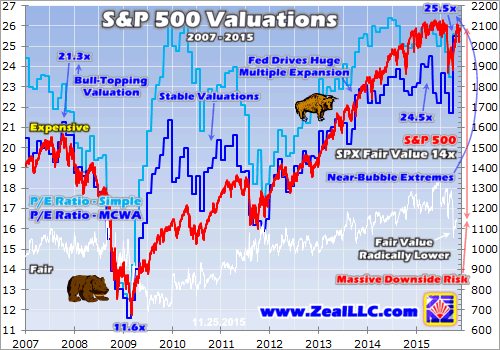 The prevailing valuations in the lofty US stock markets are increasingly becoming a bone of contention. Wall Street calmly asserts stocks are reasonably valued, since it has a huge vested interest in keeping people fully-invested. But with valuations soaring following a massive rally and weak third-quarter earnings season, they are dangerously high and portend great downside risk. Stock topping valuations abound.
The prevailing valuations in the lofty US stock markets are increasingly becoming a bone of contention. Wall Street calmly asserts stocks are reasonably valued, since it has a huge vested interest in keeping people fully-invested. But with valuations soaring following a massive rally and weak third-quarter earnings season, they are dangerously high and portend great downside risk. Stock topping valuations abound.
Since investing is all about buying low then selling high, the price paid for any investment is everything. Buy good companies at cheap prices, and you’ll multiply your wealth over time. But buying those very same good companies at expensive prices radically stunts future gains. While cheap investments have great potential to soar as traders recognize their inherent value, expensive ones have already exhausted their upside.
And it’s valuations, not absolute stock prices, that define cheap and expensive. Valuations are where stock prices are trading relative to their underlying corporate earnings streams. The less investors pay in terms of stock price for each dollar of profits, the greater their ultimate returns. Valuations are most often expressed in price-to-earnings-ratio terms, with stock prices divided by underlying corporate earnings per share.
This concept is so easy to understand, yet the vast majority of investors ignore it. Imagine purchasing a house for a rental property that has expected annual rental income of $30k. How much would you be willing to pay for it? If you can get it for $210k, 7x earnings, it will pay for itself in just 7 years. That’s a great deal. But if that same house is priced at $630k, 21x, it will take far too long just to recoup the initial cost.
The stock markets work the same way, with each dollar of profits completely fungible. And the US stock markets have a century-and-a-quarter average P/E ratio of 14x earnings. That’s fair value for the stock markets as a whole, paying $14 in stock price for each $1 of underlying corporate earnings. This makes a lot of sense, as stock markets exist to ‘lend’ capital from those with surpluses of it to others running deficits.
This post was published at ZEAL LLC on November 27, 2015.

 Follow on Twitter
Follow on Twitter
Recent Comments